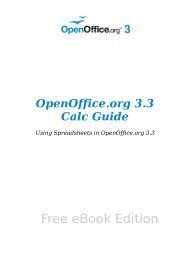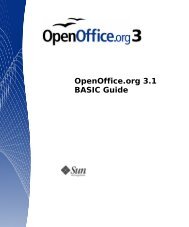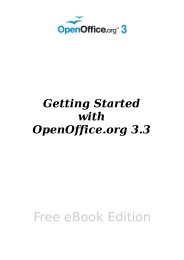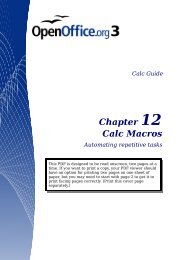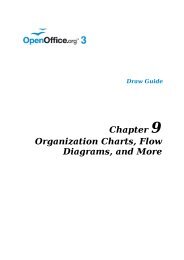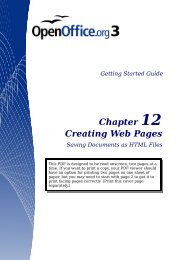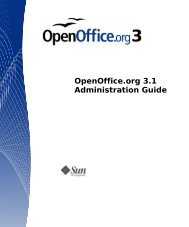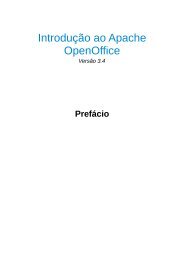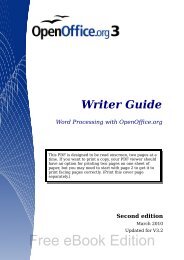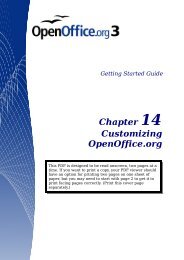OpenOffice.org BASIC Guide.pdf - OpenOffice.org wiki
OpenOffice.org BASIC Guide.pdf - OpenOffice.org wiki
OpenOffice.org BASIC Guide.pdf - OpenOffice.org wiki
You also want an ePaper? Increase the reach of your titles
YUMPU automatically turns print PDFs into web optimized ePapers that Google loves.
Strings 10<br />
Strings<br />
Strings, together with numbers, form the most important basic types of <strong>OpenOffice</strong>.<strong>org</strong><br />
Basic. A string consists of a sequence of consecutive individual characters. The computer<br />
saves the strings internally as a sequence of numbers where each number represents one<br />
specific character.<br />
From a Set of ASCII Characters to Unicode<br />
Character sets match characters in a string with a corresponding code (numbers and<br />
characters) in a table that describes how the computer is to display the string.<br />
The ASCII Character Set<br />
The ASCII character set is a set of codes that represent numbers, characters, and special<br />
symbols by one byte. The 0 to 127 ASCII codes correspond to the alphabet and to common<br />
symbols (such as periods, parentheses, and commas), as well as some special screen and<br />
printer control codes. The ASCII character set is commonly used as a standard format for<br />
transferring text data between computers.<br />
However, this character set does not include a range of special characters used in Europe,<br />
such as â, ä, and î, as well as other character formats, such as the Cyrillic alphabet.<br />
The ANSI Character Set<br />
Microsoft based its Windows product on the American National Standards Institute (ANSI)<br />
character set, which was gradually extended to include characters that are missing from<br />
the ASCII character set.<br />
Code Pages<br />
The ISO 8859 character sets provide an international standard. The first 128 characters of<br />
the ISO character set correspond to the ASCII character set. The ISO standard introduces<br />
new character sets (code pages) so that more languages can be correctly displayed.<br />
However, as a result, the same character value can represent different characters in<br />
different languages.<br />
Unicode<br />
Unicode increases the length of a character to four bytes and combines different character<br />
sets to create a standard to depict as many of the world's languages as possible. Version 2.0<br />
of Unicode is now supported by many programs — including <strong>OpenOffice</strong>.<strong>org</strong> and<br />
<strong>OpenOffice</strong>.<strong>org</strong> Basic.<br />
String Variables<br />
<strong>OpenOffice</strong>.<strong>org</strong> Basic saves strings as string variables in Unicode. A string variable can<br />
store up to 65535 characters. Internally, <strong>OpenOffice</strong>.<strong>org</strong> Basic saves the associated<br />
Unicode value for every character. The working memory needed for a string variable<br />
depends on the length of the string.<br />
Example declaration of a string variable:



